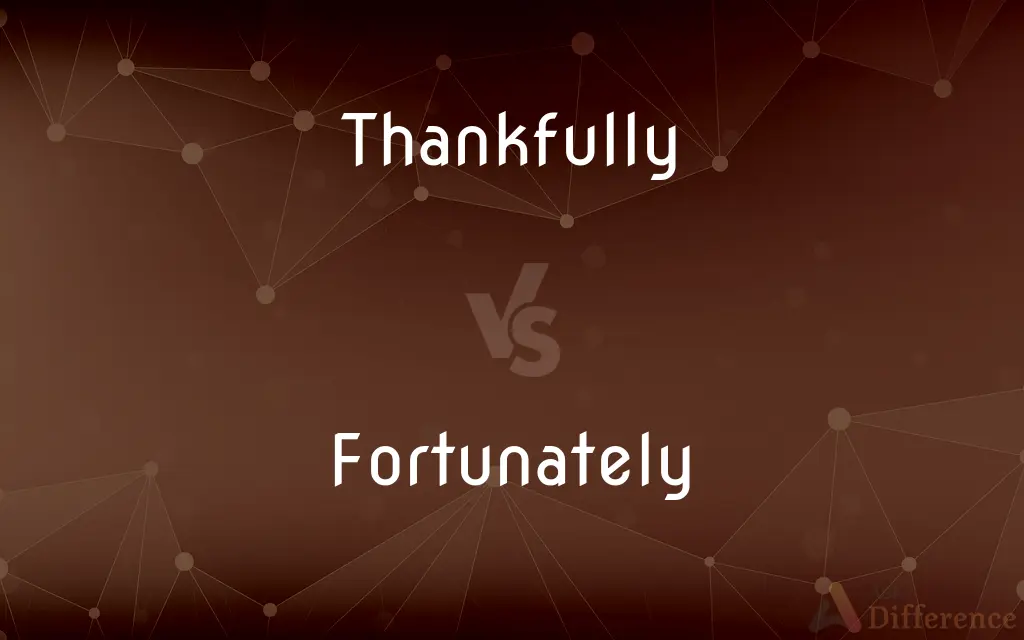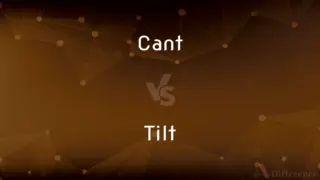Thankfully vs. Fortunately — What's the Difference?
By Tayyaba Rehman & Urooj Arif — Updated on April 5, 2024
"Thankfully" expresses gratitude for a positive outcome, while "fortunately" indicates a lucky or favorable circumstance without implying gratitude.

Difference Between Thankfully and Fortunately
Table of Contents
ADVERTISEMENT
Key Differences
"Thankfully" is used to express relief or gratitude for a positive outcome or situation, often reflecting a personal or emotional response. Whereas "fortunately" conveys that something has happened by chance or luck in a favorable way, without necessarily attributing it to someone's action or expressing personal gratitude.
While "thankfully" is often used in contexts where the speaker feels personally thankful for avoiding negative outcomes, "fortunately" is more neutral and can be used to describe lucky circumstances without implying personal feelings of thankfulness. For example, one might say, "Thankfully, we arrived safely," to express gratitude for safety, whereas "Fortunately, the weather was good," describes a favorable condition without personal emotional investment.
The usage of "thankfully" can also imply a level of emotional investment or relief from the speaker, suggesting that there was a genuine concern or worry that has been alleviated. On the other hand, "fortunately" can be used in a broader range of situations, including those where the speaker is detached or not directly affected by the outcome.
In narrative or descriptive writing, "thankfully" can add a personal touch or emotional depth, indicating the narrator's or character's relief or gratitude. Whereas "fortunately" might be used to keep the tone more neutral or factual, indicating a positive turn of events without delving into personal feelings.
Both "thankfully" and "fortunately" are adverbs that can change the tone of a sentence, but choosing between them depends on whether the speaker wants to express personal gratitude (thankfully) or simply acknowledge a stroke of luck (fortunately).
ADVERTISEMENT
Comparison Chart
Definition
Expresses relief or gratitude for a positive outcome.
Indicates a lucky or favorable circumstance.
Emotional Connotation
Yes, implies personal gratitude or relief.
No, implies luck or chance without personal gratitude.
Usage Context
Used when expressing personal thanks or relief.
Used when noting favorable circumstances by chance.
Tone
Personal, emotional.
Neutral, detached.
Example
"Thankfully, the rain stopped before our ceremony."
"Fortunately, the rain stopped before our ceremony."
Compare with Definitions
Thankfully
Expressing relief after avoiding a negative outcome.
Thankfully, we avoided the traffic jam.
Fortunately
Acknowledging a positive outcome by chance.
Fortunately, the weather cleared up for the event.
Thankfully
Showing gratitude for a positive development.
Thankfully, my friend recovered quickly.
Fortunately
Indicating a favorable turn of events.
Fortunately, the test was easier than expected.
Thankfully
Indicating personal thankfulness in a situation.
Thankfully, someone found my lost wallet.
Fortunately
Describing a lucky break or occurrence.
Fortunately, I found a $20 bill on the ground.
Thankfully
Reflecting emotional relief in narratives.
Thankfully, the story had a happy ending.
Fortunately
Highlighting a stroke of luck in narratives.
Fortunately for the hero, the guards were asleep.
Thankfully
Demonstrating appreciation for assistance.
Thankfully, she was there to help me.
Fortunately
Used when a situation unexpectedly improves.
Fortunately, help arrived just in time.
Thankfully
Aware and appreciative of a benefit; grateful.
Fortunately
Bringing something good and unforeseen; auspicious.
Thankfully
Expressive of gratitude
A thankful smile.
Fortunately
Having unexpected good fortune; lucky.
Thankfully
In a thankful manner; giving thanks.
Fortunately
One who has good fortune, especially a wealthy person.
Thankfully
(sometimes proscribed) fortunately, gratefully.
I was almost late for work, but thankfully there wasn't much traffic on the roads.
Fortunately
In a fortunate manner. en
Thankfully
For which you are thankful;
Thankfully he didn't come to the party
Fortunately
It is (or was, etc) fortunate that.
Fortunately for Sam, his pet hamster was alive.
Fortunately
In a fortunate manner; luckily; successfully; happily.
Fortunately
By good fortune;
Fortunately the weather was good
Common Curiosities
Can "fortunately" imply gratitude?
"Fortunately" does not directly imply gratitude; it's more about luck or favorable circumstances.
Is "thankfully" more emotional than "fortunately"?
Yes, "thankfully" often conveys a personal, emotional response, while "fortunately" is more neutral.
When should I use "thankfully"?
Use "thankfully" when you want to express personal gratitude or relief about a situation.
Can "fortunately" and "thankfully" be used interchangeably?
They can sometimes be used interchangeably, but the choice depends on whether you're expressing personal gratitude ("thankfully") or acknowledging luck ("fortunately").
Does "thankfully" always imply direct involvement?
Not always, but it does suggest a personal or emotional connection to the outcome.
Can the use of "thankfully" change the tone of a narrative?
Yes, using "thankfully" can add an emotional or personal layer to the narrative, indicating relief or gratitude.
Is "fortunately" appropriate in formal writing?
Yes, "fortunately" can be used in formal writing to describe favorable circumstances.
How do "thankfully" and "fortunately" affect the perception of an event?
"Thankfully" might make the event seem more personal and emotionally significant, while "fortunately" presents it as a matter of luck or chance.
Are there situations where "fortunately" is preferred over "thankfully"?
"Fortunately" is preferred when you want to emphasize the role of luck or chance without expressing personal emotion.
What nuances do "thankfully" and "fortunately" bring to storytelling?
"Thankfully" adds a layer of emotional relief or gratitude, making the story more personal, while "fortunately" can introduce a lucky element without emotional weight.
Can "thankfully" be used sarcastically?
Yes, like many words, "thankfully" can be used sarcastically to convey the opposite sentiment.
Can the misuse of "thankfully" and "fortunately" alter a message's meaning?
Yes, using one over the other can shift the focus from personal gratitude to luck, changing the perceived intent or tone of the message.
How do cultural differences affect the use of "thankfully" and "fortunately"?
Cultural perceptions of luck and gratitude may influence how and when these adverbs are used, with some cultures placing more emphasis on personal emotion or the role of fate.
Does "fortunately" imply that the outcome was entirely due to luck?
Not entirely, but it does suggest that luck played a significant role in the favorable outcome.
How does audience affect the choice between "thankfully" and "fortunately"?
Consider your audience's expectations for emotional engagement or neutrality; "thankfully" might be more suitable for personal stories, while "fortunately" could be better for formal or objective accounts.
Share Your Discovery

Previous Comparison
Sforzando vs. Rinforzando
Next Comparison
Cant vs. TiltAuthor Spotlight
Written by
Tayyaba RehmanTayyaba Rehman is a distinguished writer, currently serving as a primary contributor to askdifference.com. As a researcher in semantics and etymology, Tayyaba's passion for the complexity of languages and their distinctions has found a perfect home on the platform. Tayyaba delves into the intricacies of language, distinguishing between commonly confused words and phrases, thereby providing clarity for readers worldwide.
Co-written by
Urooj ArifUrooj is a skilled content writer at Ask Difference, known for her exceptional ability to simplify complex topics into engaging and informative content. With a passion for research and a flair for clear, concise writing, she consistently delivers articles that resonate with our diverse audience.
















































